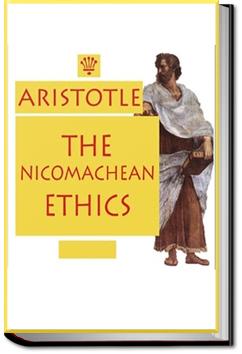UNLIMITED Audiobooks and eBooks
Over 40,000 books & works on all major devices
Get ALL YOU CAN for FREE for 30 days!
The Ethics
Aristotle
Book Overview:
The work consists of ten books, originally separate scrolls, and is understood to be based on notes said to be from his lectures at the Lyceum which were either edited by or dedicated to Aristotle's son, Nicomachus. In many ways this work parallels the similar Eudemian Ethics, which has only eight books, and the two works can be fruitfully compared. Books V, VI, and VII of the Nicomachean Ethics are identical to Books IV, V, and VI of the Eudemian Ethics. Opinions about the relationship between the two works, for example which was written first, and which originally contained the three common books, is divided. Aristotle describes his ethical work as being different from his other kinds of study, because it is not just for the sake of contemplating what things are, but rather to actually become good ourselves. It is therefore practical rather than theoretical in the original Aristotelian senses of these terms.
The work consists of ten books, originally separate scrolls, and is understood to be based on notes said to be from his lectures at the Lyceum which were either edited by or dedicated to Aristotle's son, Nicomachus. In many ways this work parallels the similar Eudemian Ethics, which has only eight books, and the two works can be fruitfully compared. Books V, VI, and VII of the Nicomachean Ethics are identical to Books IV, V, and VI of the Eudemian Ethics. Opinions about the relationship between the two works, for example which was written first, and which originally contained the three common books, is divided. Aristotle describes his ethical work as being different from his other kinds of study, because it is not just for the sake of contemplating what things are, but rather to actually become good ourselves. It is therefore practical rather than theoretical in the original Aristotelian senses of these terms.
How does All You Can Books work?
All You Can Books gives you UNLIMITED access to over 40,000 Audiobooks, eBooks, and Foreign Language courses. Download as many audiobooks, ebooks, language audio courses, and language e-workbooks as you want during the FREE trial and it's all yours to keep even if you cancel during the FREE trial. The service works on any major device including computers, smartphones, music players, e-readers, and tablets. You can try the service for FREE for 30 days then it's just $19.99 per month after that. So for the price everyone else charges for just 1 book, we offer you UNLIMITED audio books, e-books and language courses to download and enjoy as you please. No restrictions.
But for the discussion of these also there will be another opportunity, as of Justice too, because the term is used in more senses than one. So after this we will go accurately into each and say how they are mean states: and in like manner also with respect to the Intellectual Excellences.
Now as there are three states in each case, two faulty either in the way of excess or defect, and one right, which is the mean state, of course all are in a way opposed to one another; the extremes, for instance, not only to the mean but also to one another, and the mean to the extremes: for just as the hal. . . Read More
Try now for FREE!

"Love your service - thanks so much for what you do!"
- Customer Cathryn Mazer
"I did not realize that you would have so many audio books I would enjoy"
- Customer Sharon Morrison
"For all my fellow Audio Book & E-Book regulars:
This is about as close to nirvana as I have found!"
- Twitter post from @bobbyekat



Community Reviews
Happiness is the activity of a rational soul in accordance with virtue, writes Aristotle in the Nicomachean Ethics. Activity means living. Rational soul means a human being. And virtue means human excellence. So happiness means a human living excellently.
How does one live excellently? One learns to
This re-read was perhaps a slight bit superfluous. I remembered reading it way back in high school - on my own - just because I was that kind of geek.
Get the foundations read, kid! Know what the whole line of thought is all about! Use it later to trounce your fellow debaters!
Yeah, whatever. Logic a
Veo el valor, veo el aporte, veo todo el pensamiento aristotélico que ha servido como influencia para Occidente pero aún así, a mí esto me ha hecho más mal que bien sinceramente. Objetivamente merece más nota, pero subjetivamente me ha parecido un ladrillo para su corta extensión.
Nicomachean Ethics (349 BCE) deals with assessing and defining the finest behavior of humans toward themselves, others, and their surroundings. Aristotle seeks to distinguish and construct an ideal person using selected character traits known as virtues. These virtues are both intellectual and moral
O carte fundamentală. Am ales doar una dintre problemele discutate de Stagirit, fericirea.
Dacă omul vrea să atingă fericirea trebuie să-i urmeze pe zei. Numai zeul e fericit şi asta întrucît existenţa divinității se rezumă la purul exerciţiu contemplativ. A filosofa înseamnă a încerca să devii asemă
Ancient Greek philosopher Aristotle postulates the highest human good is eudaimonia or what is loosely translated into English as happiness. And a substantial component in the path to such human happiness is acting with the appropriate virtues over the course of an entire lifetime. The details of th
The Nicomachean Ethics is one of the greatest works of Aristotle, the famous philosopher who was really much more of a scientist than a philosopher. This is the book where he indulges in the discussion of happiness, virtue, ethics, politics, and really anything else describing the way in which human